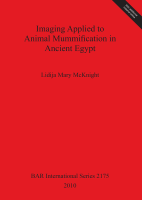Description
BOOK DESCRIPTION
The Egyptians were the only ancient civilization to intentionally preserve their animal dead using artificial mummification techniques. This practice formed part of a complex belief system which required that the physical remains of the body were preserved in order to ensure continuity of life in the next world. Consequently many thousands of animal mummies survive in the archaeological record, either at the numerous animal necropolises dedicated to the animal gods, or in the collections of museums and private collectors around the world. 127 mummified animals from four museums in Great Britain were studied using conventional radiography (X-ray) and computed tomography (CT) in order to assess the validity and potential of the techniques. The study collection was found to contain the skeletal remains (either partial or complete) of birds, cats, dogs, fish, crocodiles, snakes and rodents, the majority of which are believed to have been manufactured as votive offerings. The radiographic examination of the mummies revealed a wealth of information on both the animals themselves and the techniques which the embalmers had used in order to preserve them. Limited evidence was found to suggest evisceration, evidence of pathological conditions or cause of death; however a great deal of information regarding the positioning of the skeleton, the form of the resulting mummy bundle and the methods of wrapping were highlighted. In conclusion, the study identified the enormous potential of non-destructive radiographic techniques in the investigation of mummified animal material.











